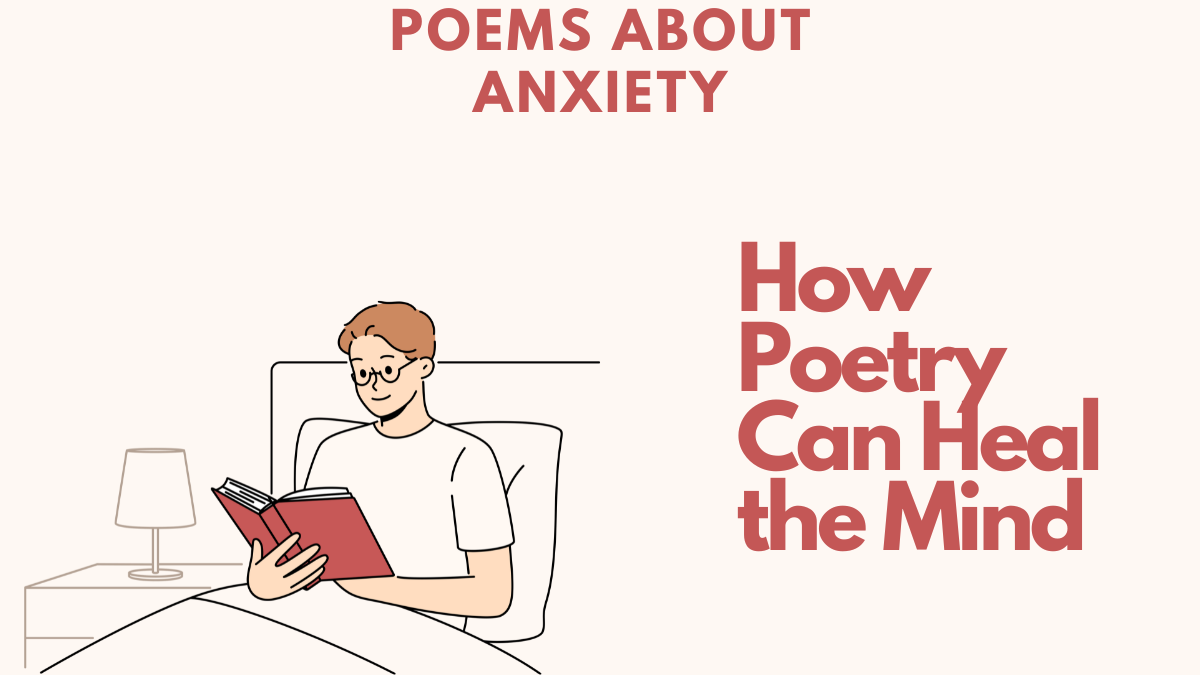People with anxiety, a prevalent mental health issue, frequently experience feelings of overwhelm and isolation. Poetry is a little-known but incredibly powerful therapeutic technique among the many that are accessible. Anxiety-related poems provide a special synthesis of expression, comprehension, and consolation that can greatly promote recovery. This essay highlights poetry’s therapeutic potential by examining how it may be a potent tool for mental health and incorporating expert psychological ideas.

Table of Contents
The Therapeutic Power of Poetry
Poetry is a powerful tool for expressing complicated emotions. Poets have been using verses for centuries to express emotions that are often unsaid. When it comes to anxiety, poetry gives voice to the inner turmoil, enabling people to externalize their fears and anxieties in a meaningful and orderly manner. Poems about anxiety are relatable because they encapsulate the essence of what it’s like to live with this condition, providing understanding and validation.
Dr. Samantha Harper, a clinical psychologist specializing in anxiety disorders, emphasizes the importance of expression in managing anxiety.
“Poetry is a creative and safe way for people to communicate their deepest feelings and thoughts. For those who struggle to express their worry in traditional ways, this kind of expression can be very freeing and healing.”
How Poems About Anxiety Can Help
1. Validation and Connection
It can be reassuring to read poetry about anxiety. It might be reassuring to know that others have gone through similar experiences since it lessens feelings of loneliness. Poetry reminds us that anxiety is a normal human emotion.
2. Emotional Release
Poetry about anxiety can be a way to let go of feelings. Writing has a therapeutic impact because it enables people to express their thoughts and feelings on paper. The weight of expressed anxieties and fears can be lessened by this procedure.
3. Reflection and Insight
A deeper awareness of one’s anxiety and its triggers might result from writing or reading poems on anxiety, which allows people to reflect on their experiences and acquire insights into their feelings.
4. Mindfulness and Focus
Poetry engagement demands a certain amount of concentration and attentiveness. Poems’ deliberate word selections and rhythmic rhythms might aid with focus and awareness. This focus might serve as a mental respite and a diversion from worrying thoughts.
5. Creative problem-solving
Writing poetry about worry can improve one’s ability to solve problems creatively. People are encouraged to think creatively and experiment with novel approaches to comprehending and controlling their anxiety.
Real-Life Examples
Readers continue to find solace and inspiration in the writings of some well-known poets who have written extensively about their battles with anxiety. For example, Sylvia Plath explored her mental health issues through her poetry. The sensation of being overtaken and choked by fear is eloquently captured in her poem “Tulips.”
“Even through the present wrapping, I could hear the tulips breathe lightly through their white swaddlings, like a terrible infant. The tulips are too red in the first place, and they pain me.”
Readers who have experienced worry of a similar kind will find great resonance in these lines, which capture its acute and frequently irrational nature.
Anne Sexton’s “The Fury of Overshoes,” in which she tackles the oppressive weight of fear, is another moving example.
“They confine me to a chamber of darkness… I’m enclosed in a light box. However, I envision a future board for all of my ghostly identities.”
These honest and unvarnished portrayals of anxiety in poetry give readers a sense of empathy and compassion.
Incorporating poetry into therapy
The benefits of using poetry in therapeutic settings are becoming more widely acknowledged by psychologists and therapists. Poetry concerning anxiety is frequently used as a therapeutic aid in bibliotherapy, which is the use of literature for therapeutic goals.
Dr. Emily Rodriguez, a licensed therapist who integrates poetry into her practice, explains:
“Poetry readings in therapy sessions can be quite beneficial. It gives people the freedom to creatively and safely explore their feelings. Anxiety-related poetry can start conversations and assist clients in better expressing their emotions.”
As part of their therapeutic process, therapists could advise their patients to create poetry about anxiety or to read poems that speak to their experiences. This method might be very beneficial for people who have trouble expressing their feelings in words.
Tips for Using Poetry to Manage Anxiety
1. Start reading.
Look into an anthology of poems about anxiety to start. An abundance of information that might bring solace and understanding can be found in anthologies and internet resources. Seek out poems that speak to your feelings and experiences.
2. Write Your Own Poems
Ignore the need for perfection. Writing poems about worry has a therapeutic effect, but the process itself is what matters most. Give yourself permission to write openly, honestly, and without self-criticism.
3. Join a poetry group.
Think about signing up for an online or in-person poetry workshop or group. Sharing your anxiety-related poetry with others can foster a sense of community and offer more encouragement and criticism.
4. Integrate poetry into the daily routine.
Make time every day to read or compose poetry. You can use this technique to develop mindfulness, which will help you maintain your composure and presence of mind in the face of everyday stress.
5. Seek professional guidance.
If you are experiencing extreme anxiety, you might want to consult with a therapist who uses creative therapies in their practice. They can assist you in examining poems about anxiety in a controlled and encouraging setting.
Conclusion
Anxiety-related poetry provides a potent outlet for thought, introspection, and healing. People might find comfort, understanding, and a sense of community in the written word. Poetry’s capacity to encapsulate the subtleties of the human experience gives those who would find it difficult to express their feelings in other contexts a voice. Poetry may be a very useful technique for anxiety management, as Drs. Harper and Rodriguez show. It provides a creative and approachable route to mental health.
Poetry about anxiety may be a very transforming experience, whether you’re reading the poetry of well-known poets or writing your own. Accept poetry’s therapeutic qualities and learn how it may calm the mind and the spirit.
Frequently Ask Questions(FAQ)
What are poems about anxiety?
Poetry that addresses the feelings, ideas, and experiences connected to anxiety is known as anxiety poetry. Poets who are sympathetic to the ailment or individuals who experience anxiety themselves can write them.
How can reading poems about anxiety help someone with anxiety?
Perusing poetry pertaining to anxiety might offer reassurance, consolation, and a feeling of unity. It provides a means of emotional release and understanding while also assisting people in realizing they are not alone in their challenges.
Can writing poems about anxiety be therapeutic?
Yes, creating poetry about anxiety has many therapeutic benefits. It offers a creative outlet for emotional expression and relief by enabling people to express their thoughts and feelings.
Are there specific poems or poets known for writing about anxiety?
Yes, poets who effectively convey the feeling of worry in their works include Sylvia Plath and Anne Sexton. Their poetry offers consolation and empathy to people who can relate to their circumstances.
How do psychologists view the use of poetry in therapy?
Poetry is seen by many psychologists as a useful therapeutic aid. It facilitates clients’ creative exploration of their feelings and can be a springboard for conversation during therapy sessions. Poem-based bibliotherapy is becoming more and more well-known for its advantages.
What is bibliotherapy?
The use of literature for therapeutic purposes is known as bibliotherapy. It entails reading particular literature, such as poetry on anxiety, to aid in understanding, provide solace, and advance mental health.
How can I start writing poems about anxiety if I’m not a poet?
Write freely at first, not caring about the structure or quality of your work. Make an effort to communicate your ideas and emotions clearly. You might eventually discover your own voice and style. It is the process, not the finished product, that has therapeutic significance.
Are there poetry groups or workshops focused on anxiety?
Yes, there are online and in-person poetry workshops and organizations that concentrate on writing about mental health, especially anxiety. These communities offer a friendly environment where you can submit poems and get comments.
Can reading or writing poetry replace traditional therapy for anxiety?
Poetry is not a substitute for conventional therapy, but it can be a potent addition to it. It is advised to get professional help from a competent psychologist or therapist for extreme anxiety. Poetry is a useful adjunct to therapy, but it shouldn’t be the only kind used.
How can I integrate poetry into my daily routine to manage anxiety?
Make time every day to read or compose poetry. Make use of this time for introspection and awareness. Establishing a regular routine will keep you focused and provide you with a reliable way to deal with your worries.

